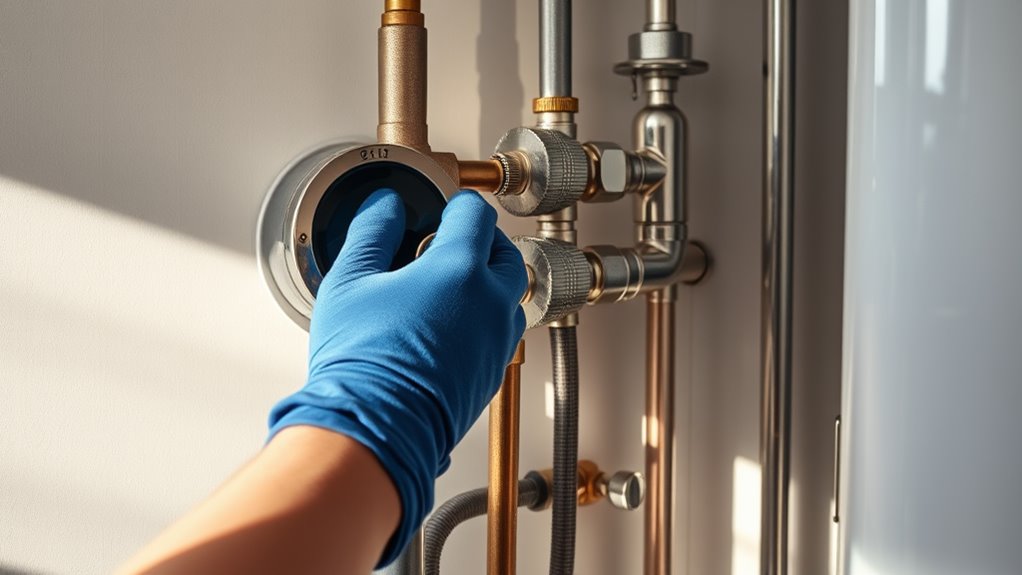Fitting your own boiler can be illegal depending on local regulations and licensing requirements, especially for gas models. Only qualified professionals should install these types of boilers to guarantee compliance with safety standards and prevent hazards like gas leaks. Ignoring these rules could lead to penalties and void your insurance. It's essential to understand these regulations to avoid legal issues and guarantee safe installation. Discover more about legal installation requirements and safety standards to stay informed.
Key insights
- Fitting your own boiler may be illegal in some jurisdictions due to strict regulations requiring professional installation, especially for gas boilers.
- Unauthorized installations can lead to significant legal repercussions, including fines and penalties for lacking proper certification.
- Insurance coverage may be voided for illegally installed boilers, risking financial loss in case of incidents.
- Non-compliance with safety standards can create serious hazards, including gas leaks and carbon monoxide poisoning.
- Professional installation ensures compliance with legal standards, reducing risks and providing peace of mind for homeowners.
Understanding Boiler Regulations
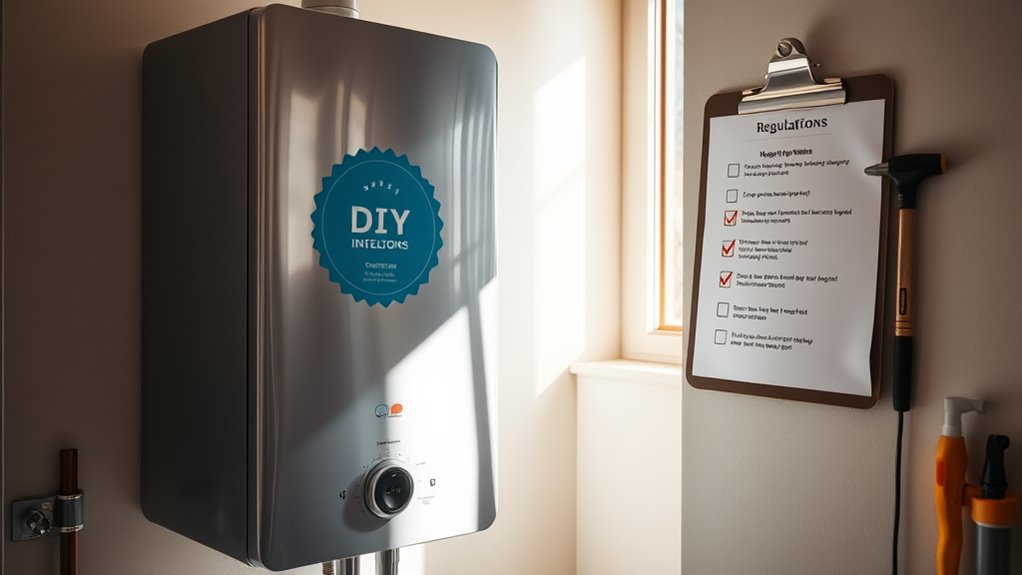
When considering fitting your own boiler, it's essential to understand the regulations that govern this process. These regulations guarantee safety and efficiency, impacting both boiler performance and installation costs. You need to familiarize yourself with local codes and standards, which dictate the type of boiler suitable for your home and the required installation procedures.
In many regions, only qualified professionals can install certain types of boilers, especially gas models. Non-compliance may lead to penalties or increased installation costs due to required modifications. Furthermore, adhering to these regulations often improves boiler efficiency, which can save you money on energy bills in the long run. Always check with your local authority to stay compliant and avoid potential issues. Additionally, obtaining a Commercial Gas Safety Certificate is crucial to validate the safety of gas appliances and systems in your home.
The Importance of Safety Standards
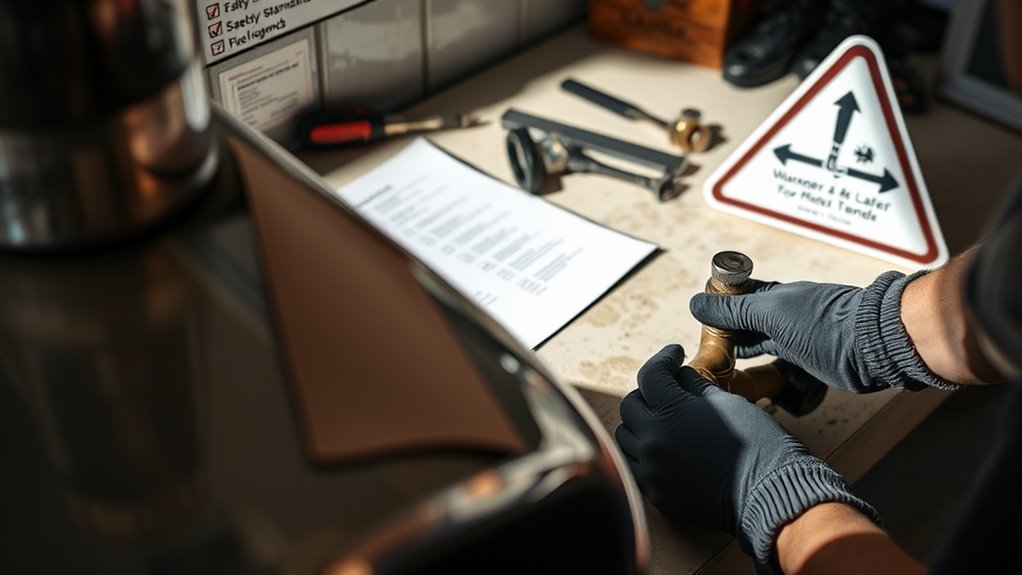
When fitting your own boiler, understanding safety standards is essential to guarantee compliance with legal requirements. Improper installation can lead to serious hazards, including gas leaks and explosions. Adhering to regulations not only protects you but also safeguards your home and family. Regular servicing ensures safe and efficient operation, reducing the likelihood of dangerous incidents.
Legal Requirements Overview
Understanding the legal requirements for fitting your own boiler is essential, as failing to adhere to safety standards can lead to serious consequences. Different boiler types have specific regulations, and you must comply with these to guarantee safety and legality. Here are key points to take into account:
- Certification: Verify that you're following local regulations and obtaining necessary permits.
- Professional Installation: Some jurisdictions require that only certified professionals handle installations, especially for gas boilers.
- Insurance Implications: Improper installation can void your insurance coverage, leading to significant installation costs if an issue arises. Additionally, ensuring compliance with safety regulations is crucial to mitigate risks associated with gas appliances.
Risk of Improper Installation
Improper installation of a boiler can lead to severe safety hazards, including gas leaks, explosions, or carbon monoxide poisoning. When you attempt to fit your own boiler, you expose yourself to various installation hazards that can compromise both your safety and that of others. It's vital to recognize that without proper training and knowledge, you might overlook essential safety assessments. These assessments guarantee that the installation meets safety standards and operates efficiently. Skipping this step can result in significant risks, as even minor mistakes can have catastrophic consequences. Always consider hiring a qualified professional who understands the complexities of boiler installation, making certain that safety protocols are followed and your home remains a safe environment. Regular preventative maintenance is essential for ensuring that your boiler operates safely and efficiently over time.
Compliance With Regulations
While you may feel confident in your ability to install a boiler, compliance with regulations is vital for guaranteeing safety and efficiency. Ignoring these regulations can lead to significant compliance challenges and potential hazards. Staying updated with regulatory changes is important for any DIY installation.
Here are key reasons to prioritize compliance:
- Safety Assurance: Adhering to safety standards protects you and your home from potential accidents.
- Legal Consequences: Non-compliance can result in fines or legal actions, affecting your finances.
- Efficiency Optimization: Proper installation per regulations guarantees your boiler operates at peak efficiency, lowering energy costs. Furthermore, compliance with safety regulations ensures that gas-powered systems operate safely and efficiently, protecting both users and the environment.
Who Can Legally Fit a Boiler?
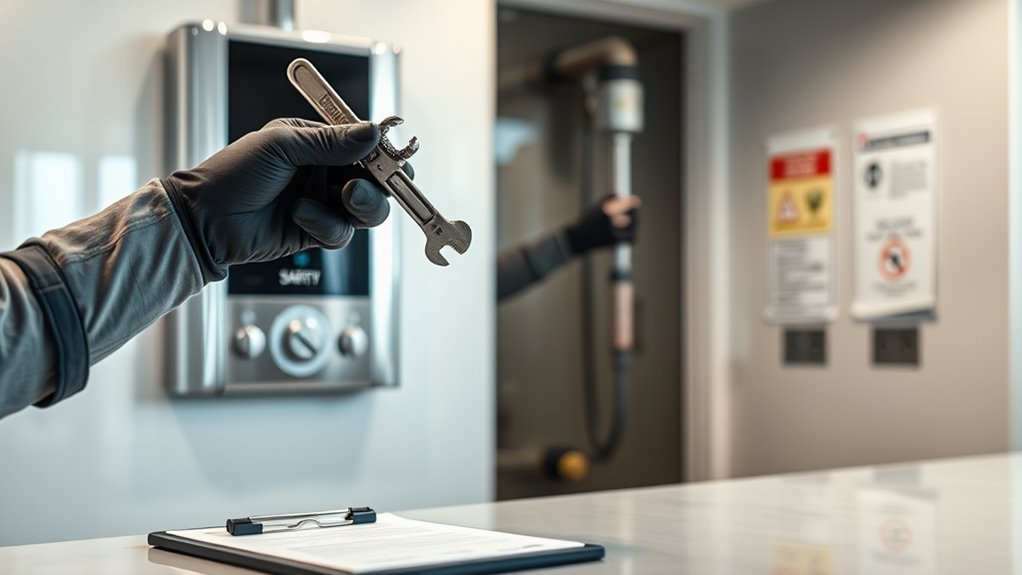
Who can legally fit a boiler? To guarantee safe and compliant boiler fitting, you need to hire a professional with the appropriate legal qualifications. In the UK, this typically means working with a Gas Safe registered engineer. These professionals have undergone rigorous training and can certify that your installation meets all safety standards. If you're considering other types of boilers, such as electric or oil-fired models, verify the installer possesses specific qualifications relevant to those systems. Attempting to fit a boiler yourself without these qualifications isn't just risky; it can also be illegal. Always verify the credentials of any technician you choose to guarantee your installation is both safe and compliant with local regulations. Regular maintenance helps prevent error codes and enhances boiler longevity.
The Role of Gas Safe Register
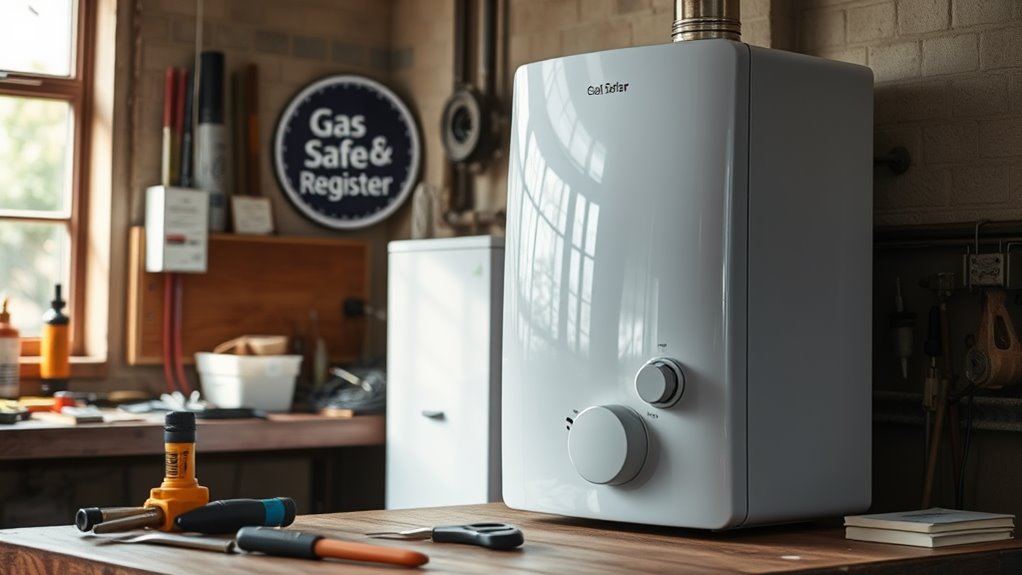
The Gas Safe Register plays an essential role in guaranteeing the safety and legality of boiler installations in the UK. By maintaining a thorough database of qualified engineers, the register helps you identify professionals who meet the necessary gas safety standards. When considering a boiler installation, you'll benefit from understanding the following aspects of the registration process:
- Verification: Only engineers registered with Gas Safe can legally work on gas appliances.
- Safety Compliance: Registered engineers must adhere to strict safety regulations, minimizing risks.
- Updates and Training: Gas Safe guarantees ongoing training for registered professionals, keeping them informed about new safety practices. Additionally, awareness of boiler error codes can assist homeowners in identifying issues that may arise during operation.
Consequences of Illegal Installations
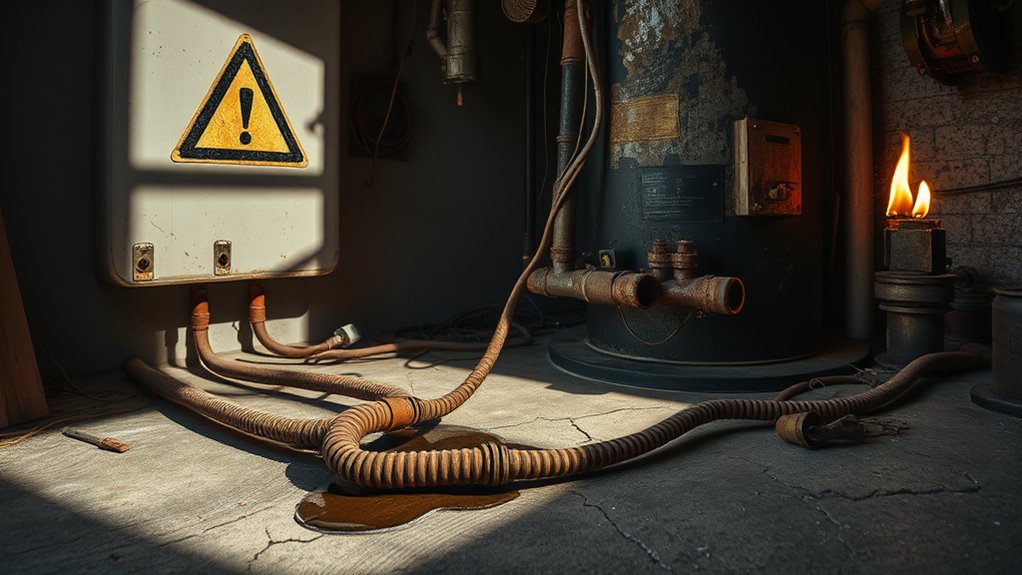
Installing a boiler without proper certification can lead to significant legal repercussions, including fines and penalties. Beyond legal issues, such installations pose serious safety risks, potentially endangering lives due to gas leaks or malfunctions. Additionally, your insurance may not cover damages resulting from illegal work, leaving you financially vulnerable. Furthermore, improper installations can lead to E119 Error Code and other operational issues that affect boiler efficiency.
Legal Repercussions Explained
Although you might think fitting your own boiler can save you money, doing so illegally can lead to serious legal repercussions. As a homeowner, you have specific responsibilities that, if neglected, can result in significant legal liabilities. Here's what you need to take into account:
- Fines and Penalties: Fitting a boiler without proper certification can incur hefty fines.
- Insurance Issues: Illegally installed boilers may void your home insurance, leaving you financially vulnerable.
- Legal Action: In case of an incident, you could face lawsuits or criminal charges for negligence. Additionally, improper installations can lead to E37 error codes, indicating significant malfunctions that further complicate legal and operational issues.
Understanding these legal repercussions is vital. It's important to guarantee your boiler installation meets all local regulations to avoid complications down the line.
Safety Risks Involved
Neglecting proper installation standards can expose you to significant safety risks. Without adhering to correct installation procedures, you might inadvertently create hazards like gas leaks or carbon monoxide poisoning. Faulty connections can lead to fires, endangering not just your property but also your life. Additionally, improper use of safety equipment, such as pressure relief valves, can result in catastrophic failures. Many DIY installations lack the necessary testing and certification, which means you won't know if your system is safe until it's too late. By bypassing professional installation, you're not just risking your own safety, but also that of others around you. Prioritizing safety and following established guidelines is vital for a secure heating system. Regular inspections by qualified engineers can help identify issues early and prevent potential hazards.
Insurance Implications Noted
What happens to your insurance coverage if your boiler installation doesn't meet legal standards? If you fit your own boiler and it's not compliant, you may face significant consequences. Insurers can deny claims related to damage or accidents stemming from your improperly installed boiler, leaving you financially responsible.
Consider these points regarding liability concerns:
- Claims Denial: Your insurer might reject claims if the boiler installation lacks proper certification.
- Increased Premiums: Future premiums could rise if you're deemed a higher risk due to an illegal installation.
- Legal Liability: You may face legal repercussions if your installation causes harm or property damage.
It's essential to guarantee your boiler meets all legal standards to protect your insurance coverage and your finances.
The Benefits of Hiring a Professional
When you hire a professional to fit your boiler, you not only guarantee compliance with legal standards but also gain access to their expertise and experience. Professionals possess expert knowledge about the latest technologies and regulations, ensuring your installation meets safety guidelines. This reduces the risk of costly errors that could arise from DIY attempts. Additionally, a qualified installer can identify potential issues before they become significant problems, leading to long-term cost savings. They can also recommend energy-efficient models tailored to your needs, further enhancing your savings on utility bills. Ultimately, investing in professional installation not only secures your home's safety but also optimizes your system's performance and longevity.
Common Boiler Installation Mistakes
Even with a professional installation, mistakes can occur that jeopardize your boiler's efficiency and safety. Recognizing these common installation errors can help you avoid serious issues later. Here are some DIY pitfalls to watch out for:
- Improper Ventilation: Not ensuring adequate airflow can lead to dangerous carbon monoxide buildup.
- Incorrect Piping: Failing to use the right materials or sizes for pipes can cause leaks or system inefficiencies.
- Neglecting Pressure Checks: Overlooking pressure adjustments can lead to boiler malfunction or even system failure.
How to Choose a Qualified Installer
Choosing a qualified installer for your boiler is vital to guarantee both safety and efficiency. Start by checking installer qualifications; confirm they're registered with a recognized body, such as Gas Safe in the UK. Look for certifications that indicate they're trained to work with your specific boiler type. Next, finding references is important. Ask for recommendations from friends or family who've had similar installations. Research online reviews to gauge their reputation. Additionally, consider interviewing potential installers to assess their knowledge and professionalism. Don't hesitate to seek multiple quotes, as this can provide insight into market rates and installer competence. By carefully vetting your options, you'll secure a skilled installer, ultimately guaranteeing a safe and effective boiler system.
Legal Requirements for DIY Installations
While you might be tempted to fit your own boiler, it's crucial to understand the legal requirements that govern such installations. Engaging in a DIY boiler installation without following regulations can lead to serious consequences. Here are some key points to take into account:
- You must comply with Building Regulations, which dictate safety standards.
- Registration with the Gas Safe Register is mandatory if you're working with gas appliances.
- Failing to meet these legal obligations can result in significant legal penalties, including fines or prosecution.
Before proceeding, verify you're well-informed and contemplate hiring a qualified professional. It's not just about saving money; it's about guaranteeing safety and compliance with the law.
Exploring Alternative Heating Solutions
If you're reconsidering the risks associated with DIY boiler installations, exploring alternative heating solutions could be a wise choice. Many homeowners are turning to alternative heating options that emphasize efficiency and sustainability. Heat pumps, for example, utilize electricity to transfer heat rather than generating it, offering significant energy savings. Biomass boilers, which burn organic materials, also represent a compelling alternative, especially with the rise of green technologies aimed at reducing carbon footprints. Additionally, solar heating systems harness sunlight to warm water or air, providing renewable energy directly to your home. These solutions not only enhance energy efficiency but can also lower your utility bills over time, making them a smart investment for environmentally conscious homeowners.
Frequently Asked Questions
Can I Legally Install an Electric Boiler Myself?
You can legally install an electric boiler yourself, but you need to be aware of electric boiler regulations. These regulations vary by location, so check local codes before proceeding. Self-installation carries risks, such as improper connections or safety hazards, which could lead to electrical fires or equipment failure. It's often advisable to hire a qualified professional to guarantee compliance and safety, ultimately safeguarding your home and investment.
What Tools Do I Need for DIY Boiler Installation?
For DIY boiler installation, you'll need several essential tools. Start with a pipe wrench and adjustable spanner for tightening fittings. A drill and appropriate drill bits are vital for mounting. You'll also require a level to guarantee proper alignment. Don't forget safety gear like gloves and goggles. A multimeter can help with electrical connections. Having these boiler installation tools ready will streamline the process and promote a safer installation.
How Long Does a Boiler Installation Typically Take?
The installation duration for a boiler typically ranges from a few hours to a full day, depending on the complexity of the system and existing infrastructure. You'll want to guarantee that the installation is efficient to maximize boiler efficiency. Factors like the type of boiler and the layout of your home can impact the time needed. Planning ahead and working methodically can help you achieve a successful installation in a timely manner.
What Are the Signs of a Poorly Installed Boiler?
You'll notice several signs of a poorly installed boiler that can compromise boiler safety. Look for unusual noises like banging or gurgling, which indicate improper fitting. Check for leaks around the joints or valves, as these installation risks can lead to more serious issues. Additionally, if your boiler frequently shuts down or fails to heat effectively, it may signal a botched installation. Always prioritize safety and consider professional help if you suspect problems.
Can I Void My Warranty With a DIY Installation?
If you decide to do a DIY installation, it could void your warranty. Most manufacturers have specific installation guidelines that must be followed to maintain coverage. Failing to adhere to these guidelines can lead to warranty implications, leaving you responsible for any repairs. Always check your warranty terms before proceeding; ensuring compliance with the requirements can save you from unexpected costs in the long run.
Summary
In conclusion, fitting your own boiler can be illegal if you're not a qualified professional. Adhering to safety standards is essential to prevent hazards and confirm compliance with regulations. Always opt for a Gas Safe registered installer to assure that your boiler is fitted correctly and safely. Attempting a DIY installation could lead to serious consequences, both legally and regarding safety. Prioritize professional help to maintain your home's heating system efficiently and safely.

